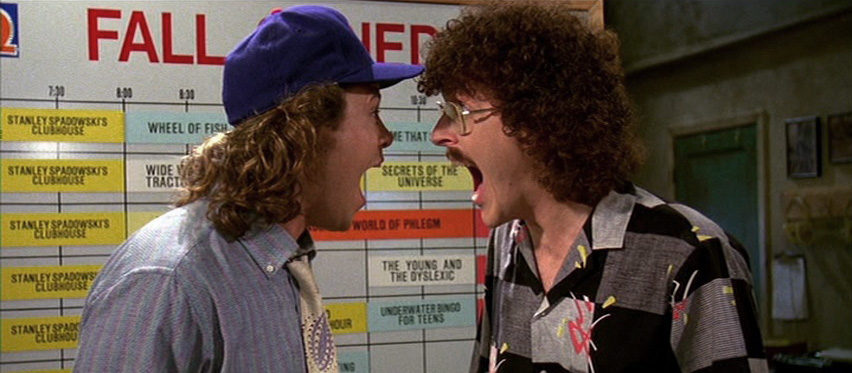
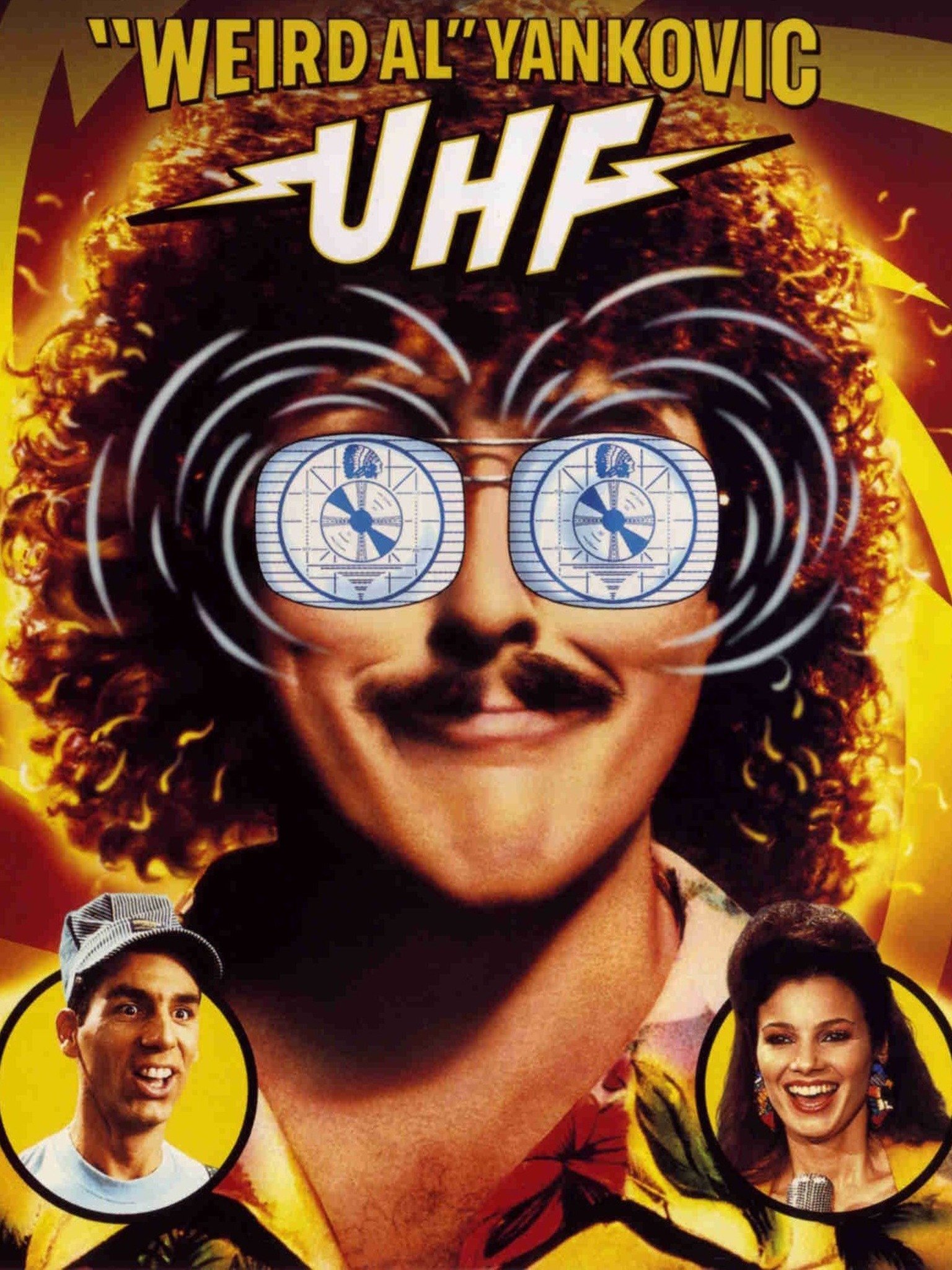
“Gun control is for wimps and commies. Listen, let’s get one thing straight: Guns don’t kill people, I do.”
There will always be a place in my heart for Weird Al Yankovic. Shortly after hearing his music for the first time, I spent a solid year pestering my parents to buy me a copy of Poodle Hat. My grandmother gave it to me for my tenth birthday and I played it so many times that it wore itself out. It’s been at least a decade since I sat down and gave it a digital spin, but if I listened to it today I could probably mumble along to a majority of the lyrics—those songs are seared into my brain.
The man is an inspiration to nerds the world over, having achieved celebrity by embracing his own dorkiness and politely poking fun at everyone and everything. And he’s been doing it for forty years! What’s cool is that unlike the average celebrity, he’s not projecting an image—well, he’s described as shyer in real life than his stage persona would suggest; but what I mean is that he’s a genuine mensch, a truly good person who respects everyone he meets, remains exclusive to his wife, stays after shows to give all his fans autographs, goes out of his way to ensure the artists he parodies sign off on his jokes even though he could legally parody their songs without permission, and modestly downplays his own talents.
The dude’s an anomaly. Who else can you name who plays an accordion, got his start by sending cassette tapes to Dr. Demento, and had his first number one album at the age of 55? Some find him intolerable, others find him amusing, but I think he’s a genius. Even as a ten year old, isolated on the musical island of Poodle Hat, without any knowledge of music outside of the few CDs my parents allowed us, I was exposed to music as diverse as Eminem, Bo Diddley, Billy Joel, Beck, and Frank Zappa (and there’s polka, too, of course). The stylistic diversity is noteworthy, no doubt, but there are several moments on the album that are downright jaw dropping, including the verbal gymnastics on the bridge of “Hardware Store” (where he’s singing like four words/second) and the lyrics of “Bob”—a parody of Bob Dylan’s “Subterranean Homesick Blues” where every line of the song is a palindrome. He’s clearly an intelligent guy, but not above following every silly whim that pops into his head and chasing it down, a trait that has established his reputation as a comedy legend.
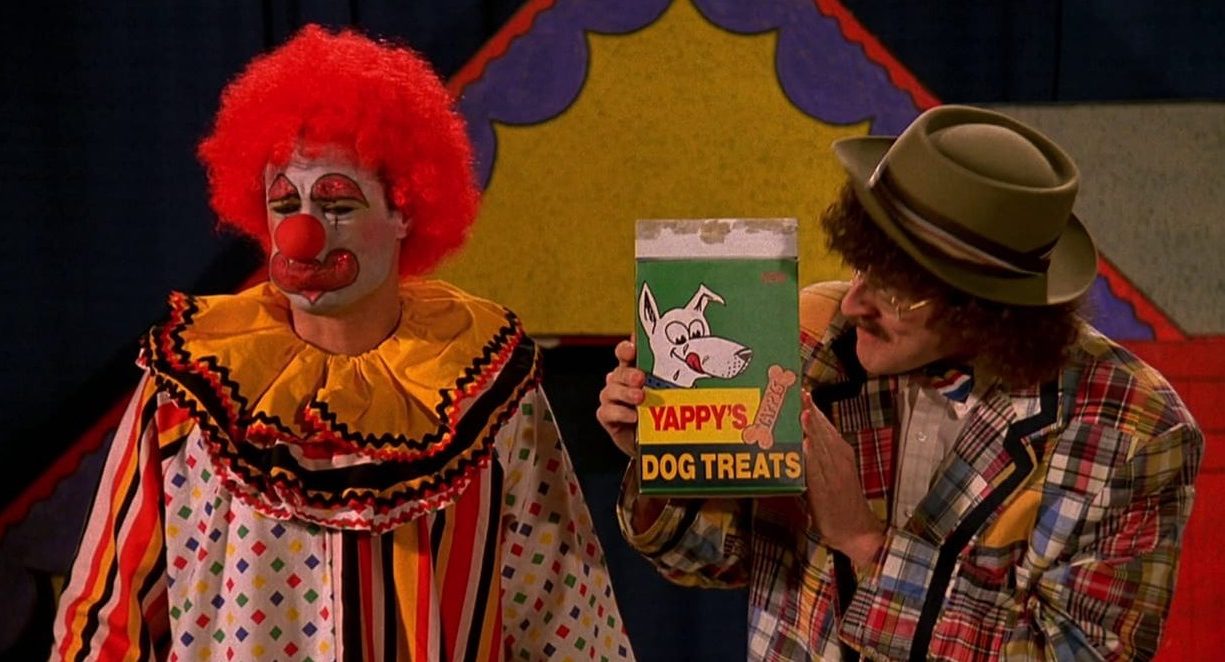
Anyway, we’re not here to talk about his music, but his lone live action film, UHF, a critical and commercial dud that had the unfortunate privilege of being released around the same time as Indiana Jones and the Last Crusade, Ghostbusters II, Honey, I Shrunk the Kids, Lethal Weapon 2, Do The Right Thing, The Abyss, Batman, License to Kill, When Harry Met Sally…, and Weekend at Bernie’s. Most professional critics, who inevitably view themselves as arbiters of good taste, were unamused by the film’s insufficiently sophisticated plot and the abundance of thematically unrelated gags that Yankovic cooked up with director Jay Levey (who is Weird Al’s manager and also plays Mahatma Gandhi II in UHF). Yankovic’s acting chops came under fire—mostly due to the fact that he intentionally plays his character straight next to the outlandish performances of his co-stars—and the general consensus was that the parodist should stick to changing the lyrics of Michael Jackson and Queen songs because his silly ideas don’t hold their charm for more than a few minutes. Weird Al would have the last laugh, though, as UHF has become a cult classic and he got a good dig in at Siskel and Ebert on his track “I Can’t Watch This” (which also includes a Twin Peaks reference that uses David Lynch’s surname as a verb).
I will concede that UHF has a flimsy, formulaic plot and stock characters, that the pepper spray of gags feels incongruous at times, and that Al is better behind the mic than in front of a camera. I just don’t think that those things detract from the fun. Sure, it’s scattershot, but the crucial thing—and this is the case with his music too—is that it’s downright funny. I wouldn’t want to listen to “Eat It” or “Smells Like Nirvana” for an hour and a half, but UHF is so granular that it never gets hung up on a single joke the way some bad comedies do. It may be disjointed but it never stops tickling the funny bone.
Yankovic and Levey fleshed out their idea after the release of Weird Al’s second album, In 3-D, with the idea of taking their same parodic approach and applying it to film instead of music. The plot centers on a deadbeat fry cook with a vivid imagination. Within the first few minutes of the the film, we witness George Newman (Yankovic) fantasizing himself as Indiana Jones—entering the crumbling ruins of an ancient temple not to steal a relic, but an Oscar statue—and then, in the real world, eating a hotdog jammed into the middle of a Twinkie, smothered in cheese wiz, and dunked in milk. But all that daydreaming happens on the clock, and George soon finds himself out of his fry cook job when he lets all the fast food burn to a crisp. Momentarily down on his luck, George’s rebound gig comes when his Uncle Harvey (Stanley Brock) wins a floundering low-budget television station in a poker game and allows George the opportunity to run it into the ground.
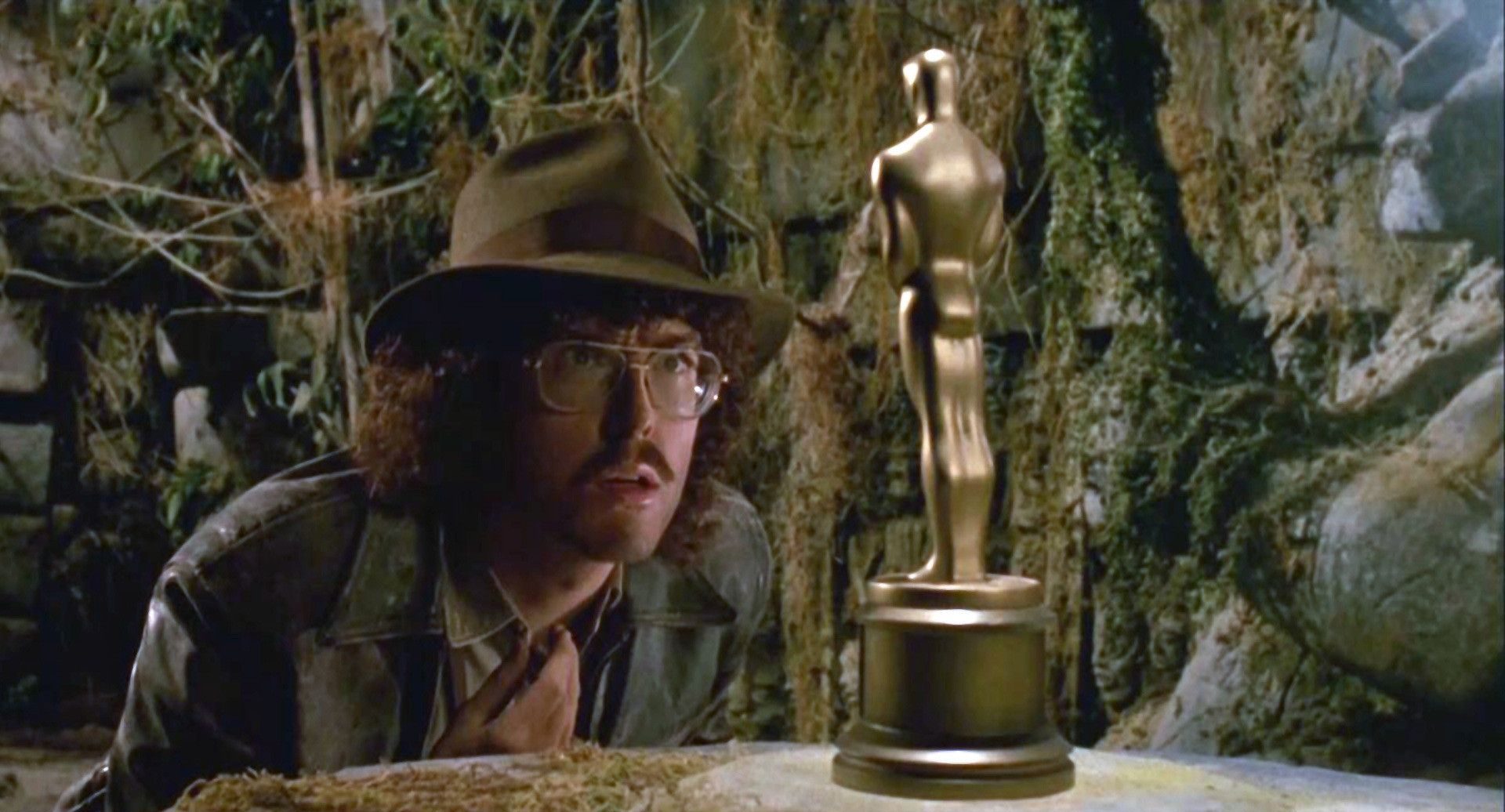
The whole enterprise is expected to fail. Channel 62’s only employees are a disgruntled secretary (Fran Drescher) and a mad scientist named Philo (Anthony Geary) who is actually an alien in disguise. The eccentric Newman soon floods the airwaves with all manner of inanity starring himself and his friends—shows like Druids on Parade, The Volcano Worshipers Hour, Underwater Bingo, Strip Solitaire, Celebrity Mud Wrestling, and Wheel of Fish. Newman himself hosts two segments, Town Talk and Uncle Nutzy’s Clubhouse. In the first, he covers local events and features local talent on the air. For instance, a high school shop teacher comes on to demonstrate the safe use of a table saw and accidentally slices his own thumb off, squirting blood all over the set.
The second program eventually falls into the hands of Stanley Spadowski (Michael Richards), the former janitor of Channel 62’s competitor, Channel 8. Richards’ performance is not entirely distinct from his Kramer character, but UHF was released the same month that Seinfeld debuted, so it’s a chicken-egg situation in my opinion. Spadowski becomes the network’s star by endearing himself to the audience with his whacky stream-of-consciousness shenanigans. At one point, I found myself belly laughing when he has the in-studio child audience participate in a contest to find a single marble in a pool full of oatmeal. The winner, who sits atop a rocking horse on wheels, is rewarded with a “drink from the fire hose.” While this can be read as a cynical comment on the state of children’s programming, it also evokes a knee-jerk laugh when Stanley literally backflips the kid off the horse by blasting him in the face with a firehose.
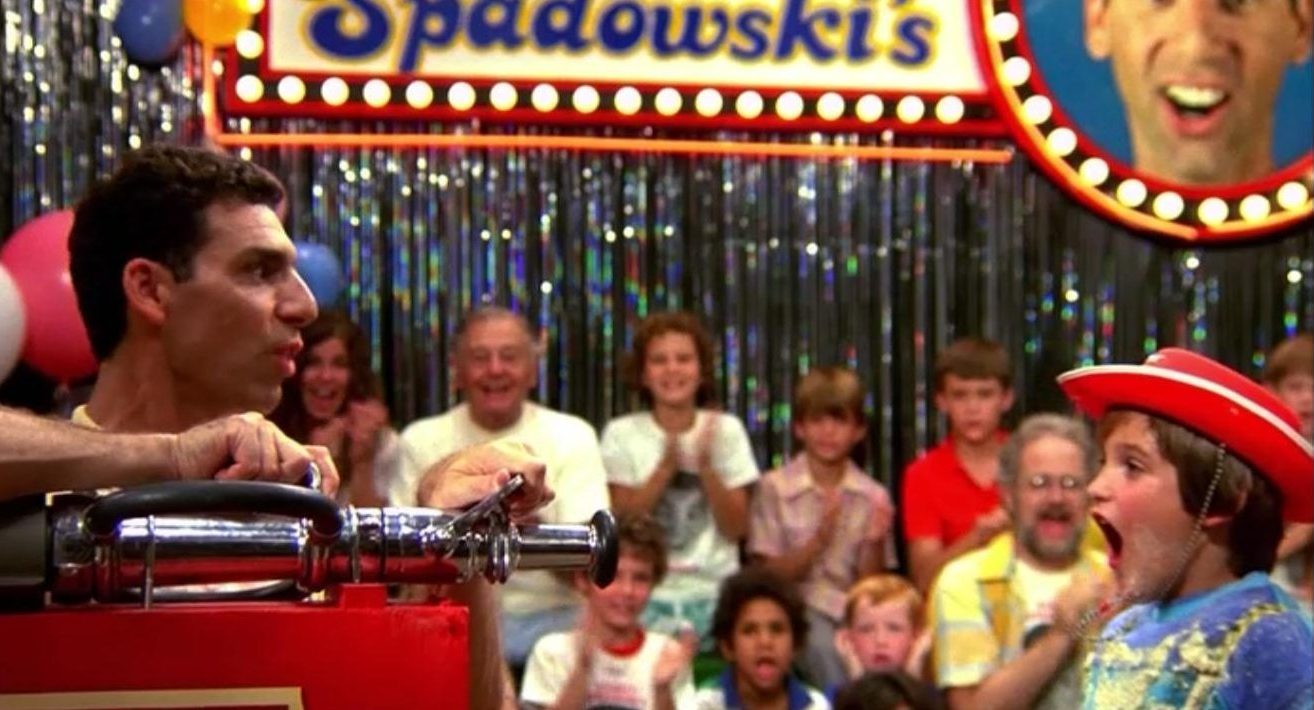
There are also a number of fake trailers and commercials mixed in here, from “Conan the Librarian” to “Gandhi II” and a satirical ad for a store called Spatula City. A couple of classic lines come from a used car salesman: “I got enough cars to choke a camel. I tell you what friends, if nobody comes down and buys a car from me in the next hour, I’m gonna club this baby seal!” and Newman’s plug for Town Talk: “Lesbian Nazi hookers abducted by UFOs and forced into weight loss programs—all this week on Town Talk.”
UHF also benefits from a pre-The Nanny appearance from Fran Drescher as Channel 62’s secretary-turned-reporter, frequently captured from a low angle because the cameraman is 3’9” Billy Barty playing a character named Noodles MacIntosh. Still another hilarious bit-part comes from Trinidad Silva (who tragically died during filming) who hosts “Wild Kingdom” from his own apartment. He rambles about his numerous pets and makes endless false claims about the creatures. By the end of his brief segment, he’s posited (and tested via trial and error) whether turtles can stick to the ceiling via suction and if poodles can fly.
Basically none of the segments expand beyond a snippet so even if their central jokes don’t land, they’re forgotten and behind us before they start to feel bad. And there certainly are a few duds, their failures mainly stemming from their cut-and-paste nature. Yankovic hits more than he misses, but there are some references that feel like they have no purpose other than homage (like the mashed potatoes gag hailing Close Encounters of the Third Kind for no apparent reason), which is fine but feels bland compared to the funnier spoofs. The worst portion may be when George zones out and fantasizes a parody of Dire Straits’ “Money for Nothing” music video—including roto-scoped animation and the lyrics to The Beverly Hillbillies theme song replacing the originals. It’s a surreal moment that feels obligatory because it’s Weird Al, but is tonally out of place.
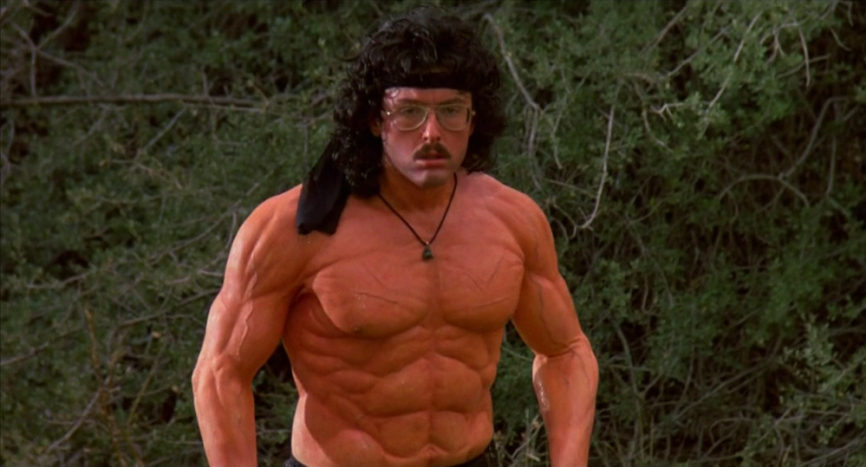
But the minor flaws never really detract from the inescapable sense of fun that UHF exudes. It may not have all of its dots and crosses and underlying structure and so many other things that polished studio movies have and we never think about, but it has more spirit than just about anything. Its independent studio vs. big business storyline clearly lacks sophistication, but by the time the Channel 62 gang takes down rival studio head R.J. Fletcher (Kevin McCarthy) and saves their beloved station, you can’t help but shrug and smile. I mean, how can you not laugh when Weird Al, clad in a muscle suit to look like Sylvester Stallone in First Blood, shoots a bad guy from three feet away with an explosive-tipped arrow?
There’s a case to be made that UHF was ahead of its time. Of course, there’s the casting of pre-stardom Michael Richards and Fran Drescher. But also consider how prototypical UHF is when compared to popular shows like Mr. Show and Tim and Eric Awesome Show from subsequent decades. Or how predictive of the viral video market that has blossomed as our attention spans have shortened and our internet speeds have increased. There was sketch comedy before this, but not much that was presented in short, disconnected snippets like UHF.
The specific spoofs are all good, and the stylistic lampooning and postmodern absurdities are mostly funny. Some of the physical comedy is lackluster, but Michael Richards makes up for any shortcomings in that department on his own. At a time when Hollywood was increasingly pitching big-budget, simple concept films, Yankovic’s evenhanded mixture of ridicule and reverence for the source material is a welcome treat.
I’m not going to say that it was a wise decision for the floundering Orion Pictures to hand over the car keys to Weird Al to help save them from their financial struggles—which bizarrely makes the story of UHF feel super meta—but I’m also not going to say that I don’t love UHF. It’s shameless goofiness might be stupid or it might be clever. Either way it’s a refreshing brew if you’re sick of the homogenized and unhealthy state of modern comedy.